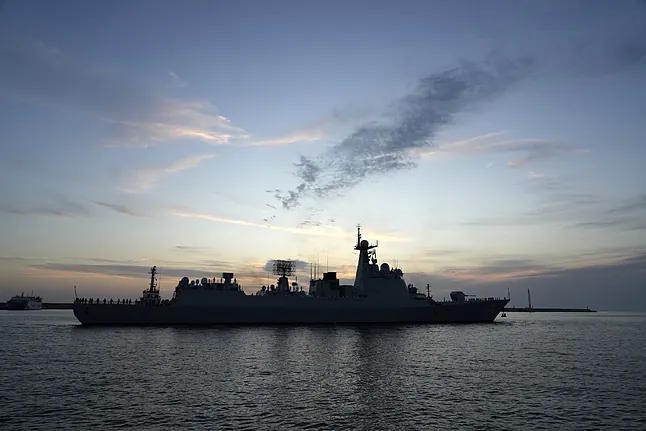After three days of flexing their muscles with joint military exercises in the Gulf of Oman, representatives from China, Russia, and Iran met on Friday in Beijing to discuss the Iranian nuclear program. The meeting coincided with a session of the United Nations Security Council to discuss Iran's growing arsenal of enriched uranium, which is reaching optimal levels for the production of atomic weapons.
Amid increased international scrutiny and U.S. pressure on Tehran, Chinese, Russian, and Iranian officials gathered their Deputy Foreign Ministers to criticize "all unilateral illegal sanctions." The three countries once again showed their growing alignment in the face of the current revolution in the world order provoked by the American Donald Trump.
"We hope to strengthen communication and coordination to resume negotiations as soon as possible. For this, the relevant parties must commit to abandoning the pressure of sanctions and threats of force," said Chinese Deputy Minister Ma Zhaoxu. According to a statement reported by Chinese state media, Russian Deputy Minister Sergei Ryabkov and his Iranian counterpart Kazem Gharibabadi also criticized U.S. sanctions against Tehran, although without directly mentioning Washington.
"We believe all parties should maintain calm and moderation", urge Chinese officials, a country that has long supported the economy of the Islamic Republic, shaken by these sanctions, by continuing to buy Iranian oil. Meanwhile, the Russians have supported Tehran by purchasing weapons for their war in Ukraine.
A decade ago, Moscow and Beijing joined Western powers in an attempt to push Tehran to limit the expansion of its nuclear program in exchange for easing international sanctions. Now, while Chinese and Russians do not hide their rapprochement with Tehran, President Trump threatens the Iranians with resorting to military force if they do not sign a new nuclear agreement.
Trump broke the 2015 negotiated agreement in his first term by his predecessor Barack Obama and backed by the UN. Since the U.S. government reimposed sanctions in 2018 and the Iranians resumed their uranium enrichment and missile programs, international experts believe that Tehran has made significant progress towards building a large reserve that is very close to being able to fuel its ambitious arms race with nuclear fuel. Although Iran repeatedly insists that its nuclear energy program is entirely peaceful.
Earlier this month, the International Atomic Energy Agency (IAEA) raised new concerns that Iran was approaching levels suitable for weapons production. "Iran's reserves of enriched uranium up to 60% in U-235 have increased to 275 kilograms, up from 182 kilograms in the previous quarter," said IAEA Director General Rafael Mariano Grossi. "Iran is the only non-nuclear-weapon state enriching at this level, which deeply concerns me," he added.
A few days ago, Trump sent a letter through an intermediary from the United Arab Emirates to Ayatollah Ali Khamenei, Iran's Supreme Leader, warning of "military intervention" if Tehran did not open up to negotiations. Washington is confident that Tehran's current weakened position - due to the defeats of Hezbollah in Lebanon and the destruction of some of its air defenses following the Israeli attack in October - is a key factor in bringing about negotiations.
"If we know they will not abide by the agreements, what sense does negotiating make?" responded Khamenei to Trump's letter. "Iran does not seek war, but if the Americans or their agents make a wrong move, our response will be decisive and accurate, and the one suffering the most damage will be the United States."
On Thursday, Washington intensified its pressure campaign by imposing sanctions on Iranian Oil Minister Mohsen Paknejad. "First and foremost, the United States should lift the sanctions," said Iranian Foreign Minister Abbas Araghchi. "We will engage in direct negotiations when we are on equal terms, free from pressures and threats."
